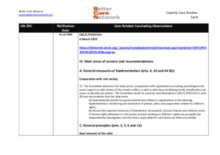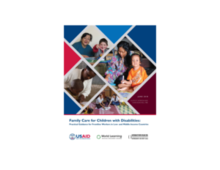Demographic Data
|
Sources: World Bank, UNICEF, UNDP HDR 2015, DHS 2014 |
Displaying 6461 - 6470 of 14424
This paper reports on a qualitative study that aimed to understand children’s experiences of private fostering and social work practice.
The paper presents findings from a study of centre-based supervised child-parent contact. The purpose of the research was twofold; to ascertain the views and experiences of birth fathers on all aspects of the supervised child-parent contact they experienced in a centre; to find out from centre supervisors their views of engaging fathers and supervising contact, and from key stakeholders and referral agents (a community project worker, a child protection social worker, Guardian ad Litems, a family law solicitor) their perceptions of the supervised contact provision in the centre.
"A pilot foster care project will be undertaken over the next year as the [Jamaican] Government moves to place more children under State care in stable family settings," according to this article from the Jamaica Observer.
This country care review includes the care-related Concluding Observations adopted by the Committee on the Rights of the Child. The Committee's recommendations on the issues relevant to children's care are highlighted, as well as other care-related concluding observations, ratification dates, and links to the Universal Periodic Review and Hague Intercountry Adoption Country Profile.
Sreyny Sorn, manager of the ABLE Project at Children in Families, gave a presentation at a side event at the United Nations Human Rights Council in Geneva on 5 March, 2019.
Drawing on in-depth interviews with fifteen community workers, who represent nine agencies assisting families with child protection issues in a small jurisdiction in Australia, the authors of this article show how the stigma attached to ‘bad’ parents is passed on to the community workers who are supporting them.
This presentation of Family Care for Children with Disabilities: Practical Guidance for Frontline Workers in Low- and Middle-Income Countries was given at the UN Human Rights Council Side Event on Promoting Quality Alternative Care for Children with Disabilities on 5 March 2019.
This country care review includes the care-related Concluding Observations adopted by the Committee on the Rights of the Child.
This study examined the effectiveness of solution-focused brief therapy (SFBT) on child well-being and family functioning outcomes for child welfare involved parents.
This research addresses one of the most pressing and controversial issues facing child welfare policymakers and practitioners today: the dramatic overrepresentation of Indigenous families in North American public child welfare systems. The article presents a successful model of inclusive education: the Center for Regional and Tribal Child Welfare Studies (the Center) at the University of Minnesota, Duluth, School of Social Work.



